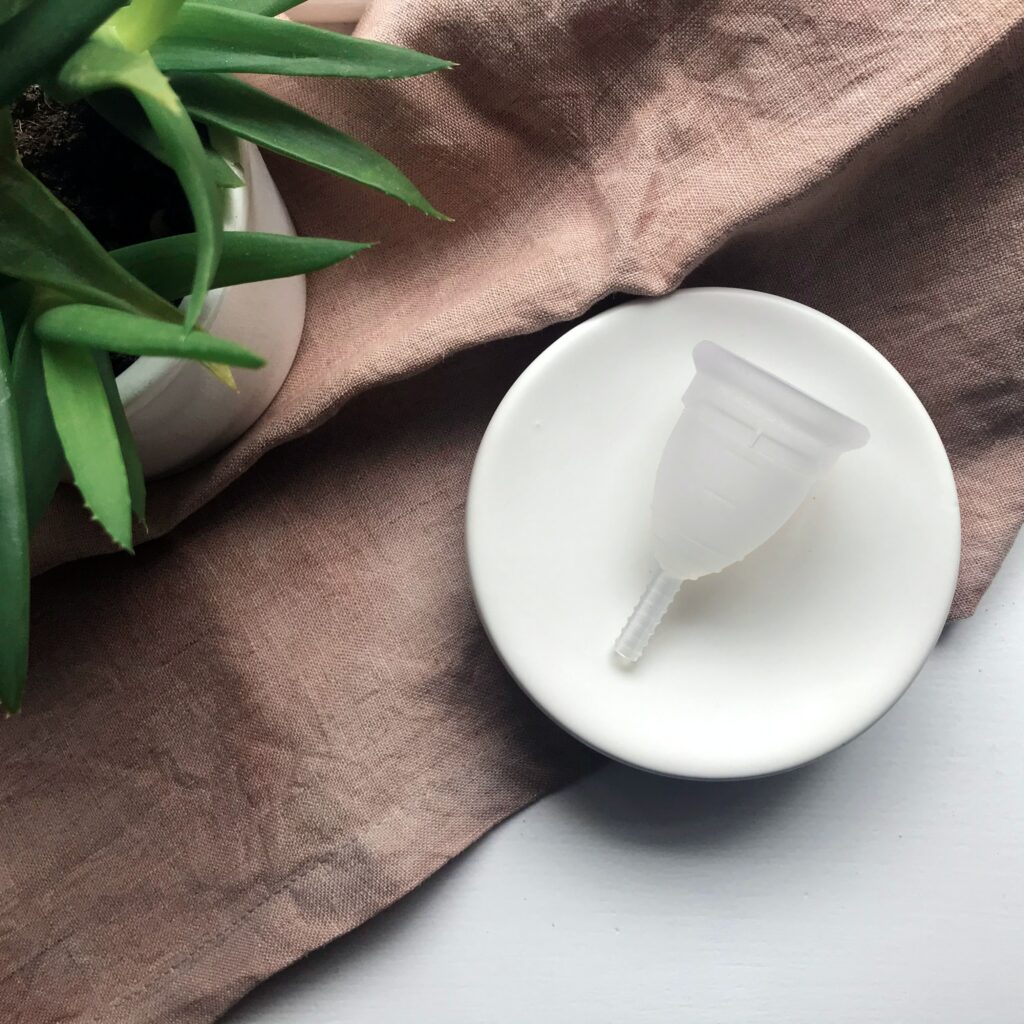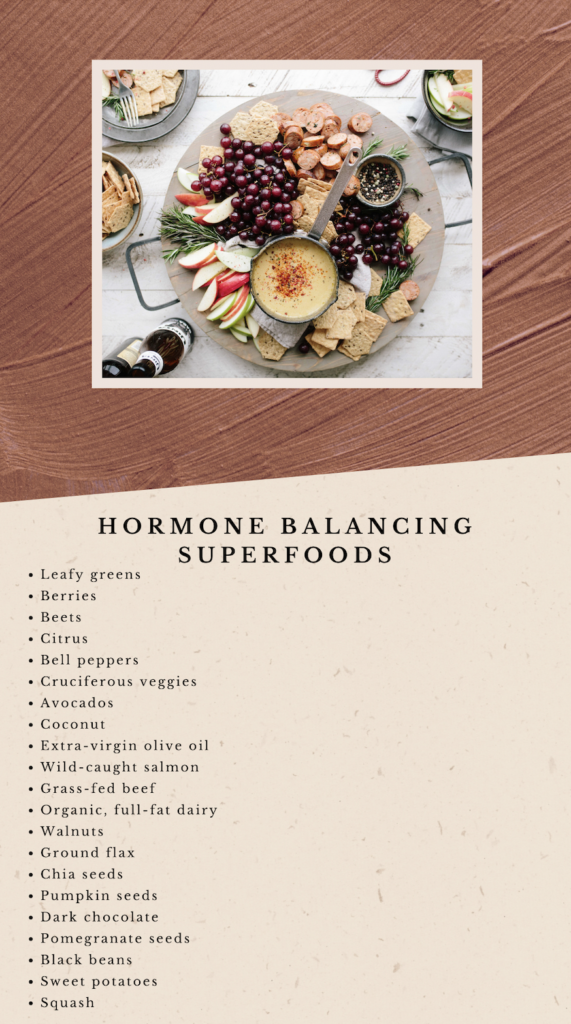This goes without saying, but proper nutrition has the power to significantly improve your hormones. In other words, your diet plays a (very) important role in hormonal production. The right foods—and the right balance of these foods—can ensure happy hormones. Au contraire, consuming too many inflammatory oils, processed foods, and sugar can cause imbalances. In turn, wreaking havoc. These hormone balancing superfoods will empower you to take the health of your hormones into your hands. There’s no better time! Yes, food is comfort, pleasure, joy, and culture, but it’s also medicinal. Use it to your advantage to bring your body into balance.

MENSTRUAL CYCLE REFRESHER
Before we dive into nutrition for happy hormones, a refresher on the menstrual cycle. Each month—during the years between puberty and menopause—a woman’s body goes through a number of changes. In essence, to get ready for a possible pregnancy.
This series of hormone-driven events = the menstrual cycle.
• menstrual: the start of your period
• follicular: 7-10 days leading up to ovulation
• ovulatory: 3-5 days of ovulation
• luteal: 10-14 days before your period
During each menstrual cycle, an egg develops and is released from the ovaries. The lining of the uterus builds up. If a pregnancy doesn’t happen, the uterine lining sheds during a menstrual period. Thus, the cycle starts again. The length of each phase can differ from woman to woman, and it can change over time. Just like the seasons, a woman’s menstrual cycle has four distinct phases: menstrual, follicular, ovulatory, and luteal.
Want to know what foods to eat for each phase of your cycle? Click this guide.

WHY is hormone balance important?
For everything! Hormones are your body’s chemical messengers. They control practically all major processes. Hormones regulate growth, sex drive, sexual development, reproduction, metabolism, fertility, and thirst—among other things. Simply put, they let the body know what to do (and when to do it), so it will run smoothly. When all is in homeostasis, your body functions properly. In turn, you operate at your maximum! However, when your hormones are unbalanced, things can go awry. Think: unwanted weight gain, an irregular period, PCOS, low libido, digestive woes, poor sleep, PMS, and more. While the endocrine system is complex, there are simple things you can do to support your hormones. Enter: hormone balancing superfoods.

WHAT CAUSES IRREGULAR MENSTRUAL CYCLES?
In other words, what causes hormone imbalance? Pregnancy aside, any of these things can alter your menstrual cycle, thus causing hormonal issues:
Birth control. The birth control pill may make your periods shorter and lighter (or disappear, entirely).
Polycystic ovary syndrome (PCOS). This hormonal imbalance prevents an egg from developing normally in the ovaries. PCOS causes irregular menstrual cycles and missed periods.
Fibroids. These noncancerous growths in your uterus can make your periods longer and heavier than usual.
Inflammatory diet. Oftentimes, the root cause of hormonal imbalance is inflammation. Chronic inflammation can damage the cells in your endocrine glands. What’s surprising is that the inflammation (that causes hormonal imbalances) often starts in the gut.
Endocrine disruptors. When absorbed in the body, an endocrine disruptor can decrease or increase normal hormone levels, mimic the body’s natural hormones, or alter the natural production of hormones.
An eating disorder. Anorexia, bulimia, and other eating disorders can disrupt your menstrual cycle and make your periods stop.
This is not an exhaustive list of reasons why a menstrual cycle can be irregular. If you sense your period is irregular (short, long, non-existent, or you spot between cycles, reach out to your healthcare provider—or let’s work together!).

vitamins and minerals you need for healthy hormones
There are a variety of vitamins and minerals your body needs in order to perform optimally. However, there are a few that are extra valuable when it comes to hormone health: vitamin D, B vitamins, magnesium, and omega-3 fatty acids. These all contribute to keeping your cycle regular and your hormones balanced. When hormones aren’t balanced, you’re left with fatigue, brain fog, PMS symptoms, unwanted weight gain, and more. However, these nutrients are key to key to ensuring your body stays in a state of balance.
1. Vitamin D
Most Americans are deficient in vitamin D, a vital nutrient that helps balance hormones. Vitamin D deficiency can lead to low estrogen—an essential hormone for your menstrual health—as well as a variety of other symptoms. Low estrogen levels cause hormonal imbalances like mood swings, breast tenderness, and irregular or missing periods. Keep in mind that vitamin D is crucial for pregnant women and babies, too.
vitamin d Foods
Not many foods are rich in vitamin D, but you can get this micronutrient from fatty fish (salmon), tuna, egg yolks, and mushrooms. You can get an extra dose of this essential nutrient by getting 5-15 minutes of sunshine every day. Vitamin D levels tend to dip in the winter months. Consider supplementing.
2. B Vitamins
There are nine B vitamins that work to maintain your nervous system, gastrointestinal system, and cardiovascular system. They also support balanced hormones throughout your menstrual cycle! One B vitamin in particular—B12—can’t be produced by your body and needs to come through diet or a supplement (vitamin B12 is mostly found in animal products).
B Vitamins FOODs
Leafy greens, such as kale, spinach, and collard greens are an excellent source of B9. Sunflower seeds contain high amounts of B3, B5, B6, and B9. Eggs are one of the best sources of B7 in addition to containing B2, B5, B9 and B12. Salmon is another source of many B vitamins. Nutritional yeast, a savory seasoning, contains many of the B vitamins, including B12.
3. Magnesium
Magnesium is an essential mineral that helps with regulating your cortisol levels (stress hormones). Magnesium helps you relax. It also plays a role in supporting your thyroid function, as well as getting quality sleep. All of these play a key role in maintaining or gaining a healthy menstrual cycle!
magnesium FOODS
While supplements can be useful, there are plenty of whole foods that contain all the magnesium your body needs. Whole grains and seeds are especially good sources of magnesium, including oats, flax seeds, pumpkin seeds, and chia seeds. Dark chocolate is also a universal favorite, which boasts a high magnesium content and prebiotic fiber to help with gut health. Not to mention, chocolate is packed with antioxidants.
4. Omega-3 Fatty Acids
Omega-3 Fats are one of the most important nutrients for women’s hormonal health. An overview of studies found that omega-3 fats can help prevent preeclampsia, postpartum depression, menopausal problems, postmenopausal osteoporosis, and breast cancer. It reduces inflammation, helps aid healthy pregnancy, and helps balance menstrual hormones. It’s truly a hormone balancing superfood!
omega-3 fatty acids FOODs
Salmon and other fatty fish are great sources of omega-3 fats. Flaxseeds, hemp seeds, and walnuts also contain high amounts of vegetarian omega-3 fats. This is another micronutrient you may want to supplement.

Which is the most important macronutrient for healthy hormones?
All macronutrients (protein, carbs, and fat) are necessary for healthy hormones. However, when it comes to hormone balancing superfoods, healthy fats are arguably the most important. Of all the best hormone-balancing habits, eating healthy fats is at the tippy top. Healthy fats are the building blocks for hormone production. Without them, we—as women—can’t produce adequate sex hormones. They’re the key to unlocking our most balanced, nourished body. We need fat for overall well-being, but specifically for good hormone health and proper hormonal balance. Let’s dive into the nitty gritty.

dietary fat makes hormones
Dietary fat aids in the production of cholesterol. And (HDL) cholesterol is the precursor to our sex hormones: testosterone, estrogen, and progesterone. In many ways, not eating enough fat (as well as the most nourishing kinds) can lead to hormonal imbalance. Aim to add at least one source of healthy fats to your plate. Examples below!
Wait, so fat is healthy?
Across the board, fat is one of the most commonly misunderstood nutrients. We’re told to avoid eating any kind of fat, for fear it will cause heart disease, weight gain, and cancer. This is far from the truth! Although some fats aren’t nourishing (in fact, they’re inflammatory), many are incredibly wholesome. Therefore, it’s important to differentiate poor quality fats from those that are beneficial for optimal health.
Good fats vs. inflammatory fats
Depending on its source, fat is a major source of energy, fuel, and nourishment. Fat is needed to build cell membranes, help you absorb certain vitamins and minerals, support balanced blood sugar, and of course, build hormones. However, for long-term health, some fats are better than others. Good fats include monounsaturated and polyunsaturated fats. On the other end of the spectrum? Industrial-made trans fats (canola, soybean, safflower, etc.). Saturated fats fall somewhere in the middle.
Examples of good fats
Add these fats to your snacks and meals to aid in satiation (fullness!) and happy hormones.
- Olives / extra-virgin olive oil
- Nuts and seeds / nut and seed butters
- Avocados / avocado oil
- Coconut / coconut butter / coconut oil
- Full-fat dairy (organic, when possible)
- Tallow
- Flax
- Chia
- Fatty fish
- Grass-fed beef
- Egg yolks
Foods to eat to balance your hormones
Without further ado, below are the best hormone balancing superfoods. Incorporate these nourishing ingredients for breakfast, lunch, dinner, and snacks! They’re rich in nutrients, help balance blood sugar, and can be incorporated in a variety of ways.

WHAT ABOUT SOY?
When it comes to foods for female hormone health, soy is highly debated. It’s widely studied for its estrogenic and anti-estrogenic effects on the body. Studies seem to present conflicting conclusions about soy, but this is largely due to the wide variation in how soy is studied. Good news! Results of recent population studies suggest that soy has either a beneficial or neutral effect on various health conditions. Soy is a nutrient-dense source of protein that can be consumed, beneficially, in moderation. When possible, opt for unprocessed, organic, and fermented soy. Think: tempeh, miso, and tamari. Curious about gluten’s impact on hormones? See here.
Caveat: women with estrogen dominance are particularly sensitive to the phytoestrogens in processed soy (this includes endometriosis, PCOS, and those with fibroids / ovarian cysts). It’s best to chat about your soy intake with your healthcare provider.

Hormone balance ebook
Ready to take the next step in your hormone-healing journey? Grab your copy of Master Your Menstrual Cycle—my holistic guide to balancing your hormones with ease. Available for only $15!
This article is for informational purposes only. It is not, nor is it intended to be, a substitute for professional medical advice, diagnosis, or treatment and we recommend that you always consult with your healthcare provider.



Leave a Reply